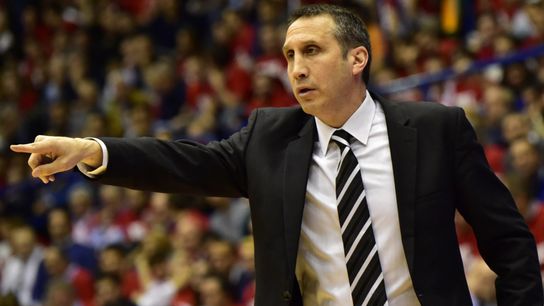On Thursday, ESPN's Marc Stein posted a piece that has the NBA world buzzing, on LeBron James's complete lack of respect for Cleveland Cavaliers head coach David Blatt.
I saw it from close range in my role as sideline reporter through the Finals for ESPN Radio. James essentially called timeouts and made substitutions. He openly barked at Blatt after decisions he didn't like. He huddled frequently with Lue, often looking at anyone other than Blatt.
There was James, in one instance I witnessed from right behind the bench, shaking his head vociferously in protest after one play Blatt drew up in the third quarter of Game 5, amounting to the loudest nonverbal scolding you could imagine -- which forced Blatt, in front of his whole team, to wipe the board clean and draw up something else.
LeBron is simply too good to behave this way, Stein writes. How could a J.R. Smith or a Matthew Dellavedova possibly respect Blatt if the club's best player won't?
Stein then turns the tables on Blatt, in a passage which I think is the crux of the piece:
Blatt, for the record, is by no means faultless here. It's up to the coach, in the Big Boy NBA, to earn buy-in from the players. For all the legitimate arguments that the job he wound up with is not the one he signed up for, given that James came home to Ohio after Dan Gilbert handpicked the 55-year-old Boston native over Alvin Gentry, Blatt has to absorb a slice of the responsibility if that hasn't happened. It's on him to convince his players he's up to the task.
So, which is it? Is it on LeBron to bestow Blatt respect, or is it on Blatt to earn it? Who's the chicken and who's the egg here?
Sports - and especially football - often mimic the military, for better or worse, in many ways, but especially when describing who barks orders to whom. The highest praise an in-command quarterback is to be called a field general. Heck, even I fall guilty from time to time, referring to assistant coaches as lieutenants. In the military model, the head coach demands respect simply because he's the head coach. His decisions are unquestioned because the chain of command runs strictly top-to-bottom, not side-to-side.
But I think we can all agree head coach-as-dictator is not the proper method for handling a staff and locker room. Not in 2015, at least. See Blatt's Finals opponent Steve Kerr evidence of that.
And yet, can you imagine walking into a locker room without any deference to the office of head coach? That's essentially what Blatt did this season. He accepted the Cleveland job before James spurned Miami and returned home, and it showed. Particularly in the Eastern Conference Semifinals when James nixed Blatt's play-call in the closing moments of Game 4.
Stein cites Tim Duncan as an example of a player that would never show that level of insubordination to his head coach, which is true. But it's equally true that Gregg Popovich inspired a level of trust in his players that Blatt has yet to do. At least not in his best player's eyes.
So, which is it? If respect for a head coach is expected, then are players expected to bestow respect for a bad coach simply because of the office he holds? And if it's earned, can a team properly with players and coaches beginning as equals?
Coaching millionaire basketball players is an entirely different animal that teenage football players, but athletes of any age see through a coach they don't believe in. Most, if not all, will engender a certain level of initial respect upon the office of the head coach, but it's on the coach to prove himself worthy of that respect.
